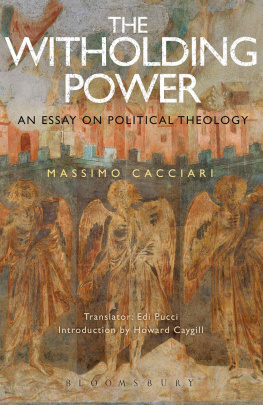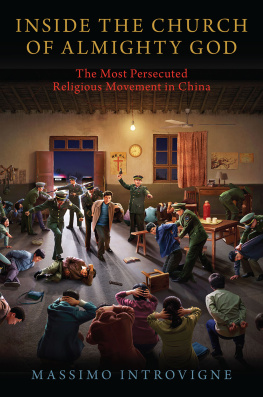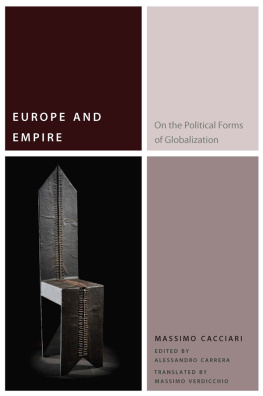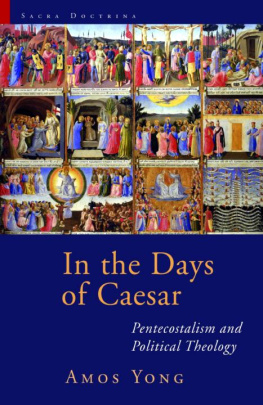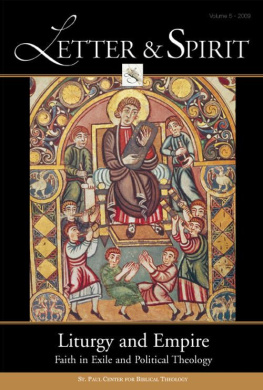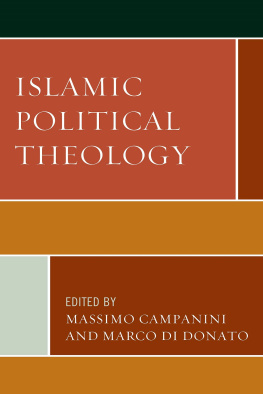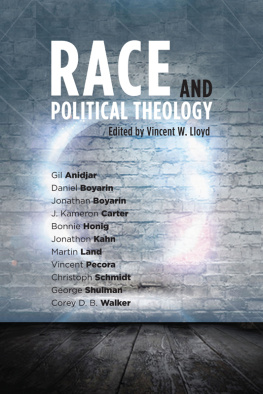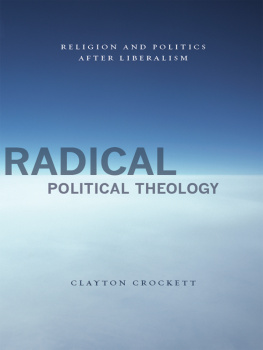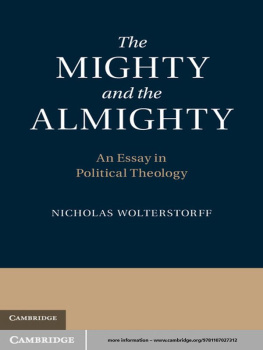
The
Withholding
Power
ALSO AVAILABLE FROM BLOOMSBURY
Philosophy for Non-Philosophers, Louis Althusser
How to be Marxist in Philosophy, Louis Althusser
Being and Event, Alain Badiou
Conditions, Alain Badiou
Infinite Thought, Alain Badiou
Logics of Worlds, Alain Badiou
Theoretical Writings, Alain Badiou
Theory of the Subject, Alain Badiou
Key Writings, Henri Bergson
Kafka, Howard Caygill
Alienation and Freedom, Frantz Fanon
Lines of Flight, Felix Guattari
Principles of Non-Philosophy, Francois Laruelle
From Communism to Capitalism, Michel Henry
Seeing the Invisible, Michel Henry
After Finitude, Quentin Meillassoux
Time for Revolution, Antonio Negri
The Five Senses, Michel Serres
Statues, Michel Serres
Rome, Michel Serres
Geometry, Michel Serres
Leibniz on God and Religion: A Reader, edited by Lloyd Strickland
Art and Fear, Paul Virilio
Negative Horizon, Paul Virilio
Althussers Lesson, Jacques Rancire
Chronicles of Consensual Times, Jacques Rancire
Dissensus, Jacques Rancire
The Lost Thread, Jacques Rancire
Politics of Aesthetics, Jacques Rancire
Of Habit, Felix Ravaisson

BLOOMSBURY POLITICAL THEOLOGIES
Edited by Ward Blanton (University of Kent), Arthur Bradley (Lancaster University), Michael Dillon (Lancaster University) and Yvonne Sherwood (University of Kent)
This series explores the past, present and future of political theology. Taking its cue from the ground-breaking work of such figures as Derrida, Agamben, Badiou and Zizek, it seeks to provide a forum for new research on the theologico-political nexus including cutting edge monographs, edited collections and translations of classic works. By privileging creative, interdisciplinary and experimental work that resists easy categorization, this series not only re-assets the timeliness of political theology in our epoch but seeks to extend political theological reflection into new territory: law, economics, finance, technology, media, film and art. In Bloomsbury Political Theologies, we seek to re-invent the ancient problem of political theology for the 21st century.
International Advisory Board
Agata Bielik-Robson (University of Nottingham)
Howard Caygill (Kingston University)
Simon Critchley (New School of Social Research)
Roberto Esposito (Scuola Normale Superiore)
Elettra Stimilli (University of Rome La Sapienza)
Miguel Vatter (University of New South Wales)
Titles in the series:
Massimo Cacciari, The Withholding Power: An Essay on Political Theology
Michel de Certeau, The Weakness of Belief
Charlie Gere, Unnatural Theology
Andrew Gibson, Modernity and the Political Fix
Elettra Stimilli, Debt and Guilt
Thomas Lynch, Apocalyptic Political Theology

Contents
Reprinted several times since its initial publication in January 2013, Massimo Cacciaris erudite philosophical meditation on the theme of the katechon in political theology might seem an unlikely bestseller. The Withholding Power: An Essay on Political Theology appeared as number 640 in the idiosyncratic but popular series of pocket-sized books Piccola Biblioteca Adelphi sandwiched between translations of Thomas Bernhards The Dying Goethe (639) and Vasuguptas Aphorisms of Shiva (641). The Piccola Biblioteca Adelphi provided a ready audience for Cacciaris work, but its success also owed much to his personal reputation as a philosopher and public intellectual in Italy (see Alessandro Carreras biographical introduction to Cacciari 2009). It also testified to the significance of political theology and its critique in contemporary Italian philosophy, politics and culture as well as the fascination with the Pauline concept of the katechon shared by recent Catholic ecclesiology and radical political theory.
The book represented an important development in Cacciaris already diverse, demanding but internally consistent philosophical authorship. His work as an author and editor from the late 1960s and early 1970s moved between political militancy The Capitalist Cycle and Workers Struggle: Montedison, Pirelli, Fiat (1969), After the Hot Autumn: Restructuration and Class Analysis (1973) and the journals Contropiano and Il Centauro to interests in the history and philosophy of architecture and German language philosophy, with Italian editions of Hartmann, Simmel, Fink and Lukcs. In the course of the repression of the 1970s and 1980s the Italian Years of Lead Cacciari joined other thinkers of the left including Mario Tronti and Antonio Negri in a fundamental rethinking of the logic of the political, in his case through the themes of crisis, rationalization and negative thought explored in Krisis: Essay on the Crises of Negative Thinking from Nietzsche to Wittgenstein (1976), Negative Thought and Rationalisation (1977) and Dialectic and the Critique of Politics: Essay on Hegel (1978). His inquiry took an increasing distance from dialectical logic and its cycles of staged opposition and reconciliation and opened itself to a thinking of crisis, decision and negation without any promise of a dialectical result or issue. It was an inquiry that traversed the work of Nietzsche, Weber, Benjamin, Schmitt and Wittgenstein, and would bring Cacciaris thinking into close but critical proximity with political theology.
In 1990 Cacciari published what he and many other readers regard as his most significant philosophical work DellInizio (On Beginning, revised and augmented 2001) that challenged the basic assumptions of Schmittian political theology. A literally pivotal work, DellInizio looks back critically to Cacciaris writings of the 1980s such as Icon of the Law (1984) and The Necessary Angel (1986) and forward to the geo-philosophical reflections on Europe Geo-Philosophy of Europe (1994) and Archipelago (1997) and the chrono-philosophy of On the Last Thing (2004), Philosophical Labyrinths (2014) and his most recent work on utopia with Paulo Prodi Occidente senza utopia (The West without Utopia). Strikingly DellInizio closes with an extended mediation on the katechon that marks a departure in Cacciaris thought and a break with the dominant spiritual tradition of political theology while also anticipating many of the themes of The Withholding Power.
Cacciaris work contributes to a well-established tradition of the critique of political theology in Italian thought and philosophy. In a memoir of the 1930s, the classical historian Arnaldo Momigliano commented on the discussions for and against Schmitts political theology already taking place in Italy under Fascism. Schmitts own tormented response in Political Theology II: The Myth of the Closure of Political Theology (1970) to Erik Petersons 1935 Monotheism as a Political Problem (Peterson 2011) and its objections to the very possibility of political theology was in many ways part of an established German/Italian dialogue, with Peterson a long-term resident of Rome and opponent of any reconciliation between theology and the political. Yet the presence and power of the Catholic Church in Italian life ensured both the urgency of political theological debate and an understanding of political theology far more extensive and profound than its most recent expression in Carl Schmitts eponymous 1922 article that first appeared in a
Next page
